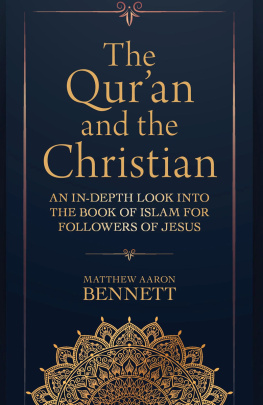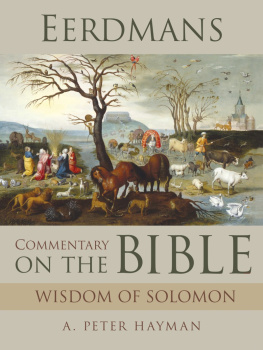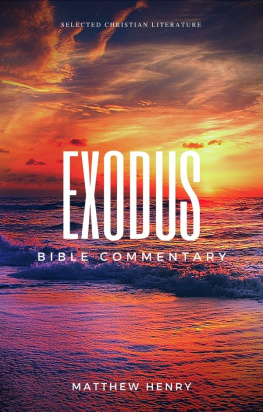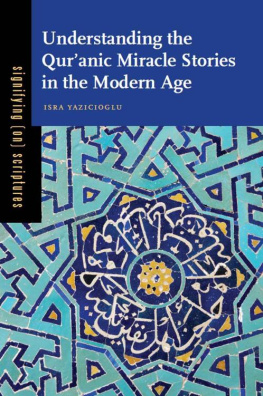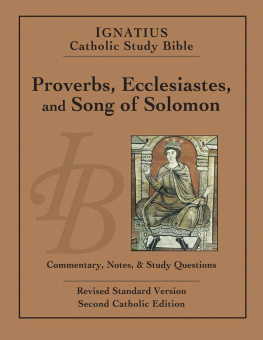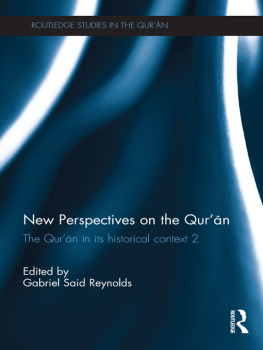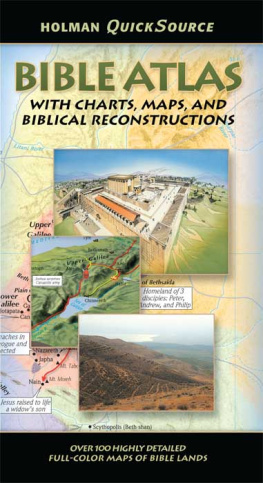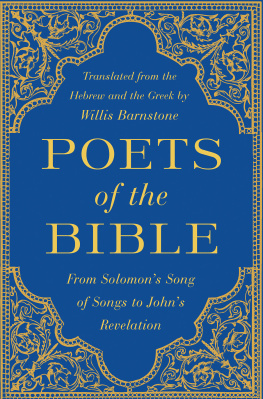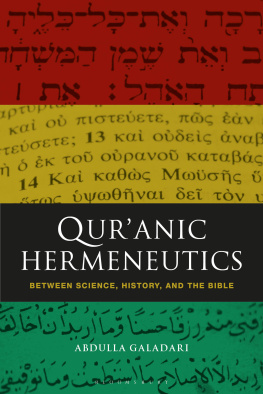Solomon and the Ant
The Quran in Conversation with the Bible
David Penchansky
Solomon and the Ant
The Quran in Conversation with the Bible
Copyright 2021 David Penchansky . All rights reserved. Except for brief quotations in critical publications or reviews, no part of this book may be reproduced in any manner without prior written permission from the publisher. Write: Permissions, Wipf and Stock Publishers, W. th Ave., Suite , Eugene, OR 97401 .
Unless otherwise indicated, I use this Quranic translation: A. J. Droge, trans. The Quran: A New Annotated Translation . Sheffield: Equinox, 2013 .
Unless otherwise indicated, Scripture quotations are taken from the New Revised Standard Version Bible, copyright 1989 National Council of the Churches of Christ in the United States of America. Used by permission. All rights reserved worldwide.
Scripture quotations marked (KJV) are taken from the King James Version of the Bible, which is in the public domain.
Cascade Books
An Imprint of Wipf and Stock Publishers
W. th Ave., Suite
Eugene, OR 97401
www.wipfandstock.com
paperback isbn: 978-1-7252-8868-3
hardcover isbn: 978-1-7252-8869-0
ebook isbn: 978-1-7252-8870-6
Cataloguing-in-Publication data:
Names: Penchansky, David, author.
Title: Solomon and the ant : The Quran in conversation with the Bible / David Penchansky.
Description: Eugene, OR: Cascade Books, 2021. | Includes bibliographical references and index.
Identifiers: isbn 978-1-7252-8868-3 (paperback). | isbn 978-1-7252-8869-0 (hardcover). | isbn 978-1-7252-8870-6 (ebook).
Subjects: LCSH: Qur'anCriticism, interpretation, etc. | Qur'anRelation to the Bible. | PolytheismIslam. | Good and evilReligious aspectsIslam. | RevelationIslam.
Classification: BP B P 2021 (print). | BP134 (ebook).
08/02/21
Praise for Solomon and the Ant
This is a conversation between the Quran and the Bible as serious as it is simple. Applying a wealth of scholarly experience, Penchansky engages the holy texts both thematically and thoughtfully. Using his mastery of post-biblical and Islamic traditions, the author ensures a robust discussion about how readers wrestle with God through the stories of scripture.
Emran El-Badawi, University of Houston
Some of the most obscure Quranic passages that seem to discuss fantastical realms, such as the jinn or demons, speaking animals, magical worlds of angels or deities, and mystical journeys have no recognizable biblical counterparts. Yet Penchansky is so well-versed in biblical literature that he brings a genuine voice artfully and skillfully mirroring Quranic narratives with similitudes in biblical literature. Away from any polemics, this is brilliantly an honest and sympathetic reflection that would undoubtedly enlighten and enrich any reader of the Quran.
Abdulla Galadari, Khalifa University of Science and Technology
This book makes a unique and important contribution to the study of the relationship between the Bible and the Quran. Adopting a thematic approach, Penchansky offers a set of insightful and creative studies that explore how the two texts address the topics of polytheism, theodicy, and revelation. Readers will come away with a deeper appreciation of the fascinating interconnections that exist between the scriptures of the monotheistic traditions.
John Kaltner, Rhodes College
The Qurans narrative extension of the biblical tradition has been the subject of much scholarly discussion. While most scholars who engage in this field are trained in Quranic studies, Penchanskys training in the Hebrew Bible makes Solomon and the Ant an important and unique contribution. Through a careful analysis of parallel stories in the Bible and the Quran, this book demonstrates how the two scriptures share the same cultural milieu, without losing sight of the Qurans theological peculiarity, and it does so with commendable clarity.
Munim Sirry, author of Controversies over Islamic Origins
Dedicated to my longtime brothers,
David Barnes, Fr. Richard Vettel-Becker,
Turner Collins, and Don McSpaddon
Introduction
W hats so special about the Quran? Muslims believe their sacred book consists of the actual words of God in Arabic, dictated to the Prophet Muhammad by the angel Gabriel. How does one examine such a claim, which goes beyond what most Jews and Christians believe about their holy texts? The Quran claims that its divine nature will be obvious to anyone who reads it with an open heart. These are some Quranic texts that make this claim:
If you are in doubt about what We have sent down to Our servant, then bring a sura [chapter] like it, and call your witnesses. (Q :)
Or do they say, He has forged it? Say: Then bring ten suras forged like it, and call on whomever you can, other than God, if you are truthful. (Q :)
Say: If indeed humankind and the jinn joined together to produce something like this Qurn, they would not produce anything like it, even if they were supporters of each other. (Q :)
I, a sympathetic reader, hope to gain access to the excellence and profundity of the Quran, I seek evidence of the divine presence Muslims claim emanates from the reading of the book. Notice I said reading of the book. There is one aspect of the Quran unavailable in this study. Quran means recitation, and a Muslims primary relationship to the book is through chanting its contents or listening to its words chanted in Arabic. All I can do here is access that aspect of the Quran that one can reach through reading. The Quran, like the Bible, consists of many different types of literature, such as laws, prayers, ritual instruction, and apocalyptic visions. However, because I encounter the Quran as a relatively new visitor, I begin with narrative. It is an easy place to start because everyone relates to a story.
In what follows, I analyze nine stories from the Quran. Although some of these Quranic tales involve biblical characters (Moses, Solomon, and the Queen of Sheba), those I have chosen scarcely overlap with the Jewish or Christian Scriptures. However, in many ways these stories bring to mind biblical texts, ones that address similar themes and concerns to those found in the Quran. Bringing the Quran and Bible together in this way enriches understanding of both. John Kaltner observes, Revisiting a familiar Bible story with the theme and message of its Quran parallel in mind can allow us to notice elements of it that have previously gone unrecognized. This remains true even though my work does not examine Quranic parallels to biblical texts, as Kaltner does.
My training is in the Hebrew Bible. I here examine what for me is an alien text, a strange text, and a whole interpretive tradition that had been unfamiliar to me. Why have I strayed so far from my chosen field? At least in part, it was because of the Muslim claim that the sublimity and uniqueness of the Quran will be obvious in any serious examination. This drew me. I am curious about the attraction to this book and about its veneration by over a billion people.
I chose the nine Quranic passages because they were compelling narratives. I looked for stories with vivid characterization and drama. Also, I looked for passages skirting the edge of orthodoxy. I search out Quranic texts that appear to represent the earliest stages of Islamic formation. When the community began fashioning its identity, it was at a time when many pre-Islamic practices and beliefs were being examined and reconsidered by the new community. These passages, then, inhabit the borderland between the Islamic community and the surrounding culture. As I approached each of these stories in turn, certain common themes emerged, and this became the structure of my study.


